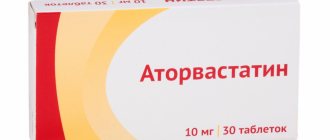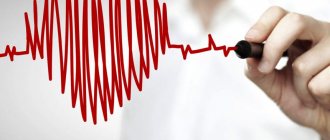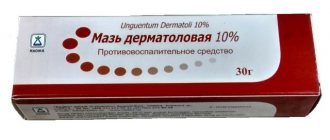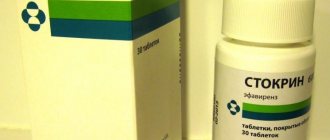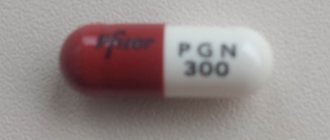Effects of lithium drugs
Lithium is an ion that:
- stops outbursts of anger and auto-aggression after EEG diagnostics;
- quickly relieves the state of acute mania with agitation;
- has proven effectiveness in the treatment of manic episodes, as well as in the maintenance treatment of manic and depressive episodes,
- prevents the development of suicide in patients with mood disorders;
- slows down the development of Alzheimer's disease;
- enhances the effect of antidepressants, which facilitates the use of lower doses of the latter, which means minimizing side effects.
The enhanced effect of antidepressants opens up broad possibilities for the treatment of depression. However, this use should be carried out strictly in a 24-hour hospital setting, where it is possible to monitor the condition by measuring the concentration of lithium in the blood and evaluate drug interactions.
Monitoring the concentration of lithium in the blood
Lithium preparations have very narrow concentration limits where the therapeutic effect is revealed.
At the beginning of therapy, it is necessary to measure the concentration of lithium in the blood plasma once every 2 weeks. If the dose is changed, repeat the measurement after a week. If the plasma concentration remains stable for several weeks, it is sufficient to measure it once a month, and after stabilization of the concentration for 6-12 months. – measure once every six months or according to clinical indications.
Concentrations above 3.0 mEq/L are fatal.
Target concentrations:
- When enhancing the effect of other drugs, 0.4-0.8 mEq/l,
- In the treatment of bipolar mania, 0.6-1.2 mEq/L.
At increased concentrations, the drug becomes toxic, causing side effects such as impaired renal function, hair loss, tremors, acne, deterioration of cognitive functions and impaired coordination. In this case, a visit to a doctor is indicated; in case of rapid deterioration of the condition, gastric lavage, diuresis with mannitol or hemodialysis.
It is important to understand that the indicated concentrations are not strict limits and should be interpreted by a doctor in each individual case.
Indications for the use of lithium drugs in psychiatry:
- Manic state. Hypomania.
- Depression.
- Suicidal behavior.
- Schizoaffective disorder.
- Bipolar affective disorder, cyclothymia.
- Disorders of sexual preference.
- Migraine. Meniere's disease.
- Alcohol addiction, addiction to psychoactive substances.
Contraindications:
- Absolute: kidney diseases with a decrease in their functions (glomerulonephritis, pyelonephritis, etc.).
- Relative: eu- and hypothyroid goiter, salt-free diet, senile cataracts, osteoporosis, diseases occurring with high fever and increased sweating, the first 3 months. pregnancy and lactation period.
Precautions:
- Constant supervision by a psychiatrist throughout the entire treatment period.
- Monitoring thyroid function (once every 6 months or as directed by your doctor);
- Blood test at least once every 6 months. at late stages of treatment;
- Monitoring renal function (urinalysis, determination of renal concentrating ability, creatinin clearance, electrolytes, nitrogen, urea in the blood);
- Examination by an ophthalmologist once every 6 months (or at other times as decided by the attending physician).
Lithium preparations
There are many forms of medications containing lithium for medicinal purposes. The most common active ingredient is lithium carbonate. In pharmacies it can be found under the following trade names: sedalite, contemnol, micalite, litosan, etc.
To summarize, we can conclude that lithium is universal in terms of its impact on the sphere of mood and emotions, with a proven clinical effect in aggressive and suicidal conditions, which often unfolds within the framework of bipolar affective and schizoaffective disorders. However, when prescribing lithium drugs, the above conditions should be adhered to in order to achieve an optimal and comfortable effect. Therefore, determining the required dose and selecting a convenient regimen for taking the drug should be strictly under the supervision of a psychiatrist.
Indications
Ministry of Health of Russia
- Manic and hypomanic states of various origins
- Prevention and treatment of affective psychoses
- Prevention and treatment of affective disorders in patients with chronic alcoholism
- Migraine, Meniere's syndrome, sexual disorders, drug addiction.
FDA recommendations
- Manic states in manic-depressive illnesses
- Prevention of manic states
UK Medicines and Healthcare Products Regulatory Agency guidelines
- Manic and hypomanic episodes
- Depressive episodes when antidepressants have not worked
- Preventing exacerbation of bipolar disorder
- Aggressive behavior
Treatment regimen
Dosage and dose selection
Required plasma concentration level:
Mania: 1.0-1.5 mEq/L Depression: 0.6–1.0 mEq/L Maintenance dose: 0.7–1.0 mEq/L
Treatment should begin with a dose of 300 mg 2-3 times a day.
How quickly does it work?
Response to acute mania may occur within 7-14 days.
Therapeutic effect: 1-3 weeks.
Expected Result
Disappearance of symptoms.
If it doesn't work
Check the level of the substance in the blood;
Increase the dose;
Switch to another drug or add another drug;
Connect psychotherapy;
Determine if there is a comorbid condition
How to stop taking it
Reduce dose over three months. If taken abruptly, the risk of suicide may increase [1].
Treatment combinations
- Valproic acid
- Atypical antipsychotics
- Lamotrigine
- Antidepressants (with caution, as there is a risk of mood destabilization) [1].
Use of lithium in psychiatry
This type of medicine was first used in this area of medicine about forty years ago. Lithium drugs are used in psychiatry to significantly alleviate the symptoms of manic depression (a mental disorder characterized by sharp transitions from absolute despair to uncontrollable delight; also known medically as bipolar disorder). Although, of course, the substance in question will not be able to cure the disease fully, but it will help smooth out its extreme manifestations.
It is also important to note that each drug containing lithium effectively normalizes mood and corrects the emotional state of depression.
Mechanism of action
The main pharmacological effect of lithium salts is the activation of the reuptake of free norepinephrine and serotonin by adrenergic endings in the central nervous system, which form the development of affective states. The therapeutic effect reduces the number of b-adrenergic receptors and suppresses noradrenergic activity.
Lithium ions suppress sodium ions in nerve and muscle cells, thereby interfering with the transport of monovalent cations through membranes and weakening nerve impulses.
“Li” blocks the activity of neuronal dehydrogenase enzymes that synthesize inositol, which regulates the sensitivity and cellular respiration of neurons.
Drug therapy "Li" shows the best results in the treatment of mixed affect, when patients have a manic syndrome. In this case, there must be a sufficiently large clear gap between the phases of the cycle, then lithium salts exhibit a stabilizing effect on the patient’s psyche.
Bottom line
It is possible to alleviate the condition of patients who suffer from a variety of mental illnesses accompanied by serious emotional disorders thanks to a number of medicines made using lithium salts. Such medications, judging by reviews from experts and real customers, are incredibly effective and help relieve conditions of varying severity. Treatment with drugs from this group should be prescribed by a competent attending physician, who will be able to competently formulate a treatment regimen and later, if necessary, adjust it. You should not make the decision to use lithium on your own. In this case, you can make mistakes that will negatively affect the patient’s condition or provoke lithium poisoning, which sometimes leads to death. It is important to pay sufficient attention to the study of contraindications and possible side effects. This will help to avoid unpleasant surprises or be prepared for any negative reactions from the patient’s body. Constant monitoring by the attending physician will guarantee the successful completion of the prescribed therapy.
Never forget to take care of yourself. Make an effort to choose the best quality drug. Pay sufficient attention to the physical and mental well-being of your loved ones. Be always healthy!
Interaction with other substances
- Non-steroidal anti-inflammatory drugs, including ibuprofen, as well as diuretics and ACE inhibitors may increase lithium levels in the blood, therefore, they should be used with caution if the patient's condition has been stabilized on a certain dose of lithium
- Metronidazole increases lithium toxicity
- Acetazolamide, alkalis, xanthine and urea reduce lithium levels
- Methyldopa, carbamazepine and phenytoin may increase lithium toxicity
- Use calcium antagonists with caution as they may increase lithium toxicity
- SSRIs may increase the likelihood of dizziness, confusion, agitation, diarrhea, and tremors
- Haloperidol with lithium may lead to encephalopathic syndrome
History of formation
Even in ancient times, healers noticed the calming effect of alkaline waters from certain mineral springs. Scientific medicine discovered lithium salts as a remedy for gout in 1859. It was found that when taking lithium, the solubility of uric acid crystals increases, but the use has toxic consequences.
Australian scientist John Cade in 1949 injected the urine of psychotics with lithium salts into the abdominal cavity of guinea pigs and unexpectedly discovered a sharp decrease in the toxic effect. He extended this experiment on some of his patients with mental disorders and obtained good results. This experience gave him reason to believe that lithium deficiency was the cause of manic states.
Li salts began to be used as substitutes for table salt for hypertensive patients. The side effects of the metal on the human body still led to the death of four patients. The United States immediately banned lithium products and began using them again only in 1970.
"Quilonum"
The main component of the drug is lithium carbonate. This drug is available in the form of capsules or tablets, which are coated with a specialized coating.
Quilonum tablets are lithium preparations, the action of which is aimed at relieving manic states of various origins, schizoaffective psychoses, migraines, sexual disorders, alcoholism, manic-depressive psychosis, as well as various drug addictions.
There are some conditions that prevent patients from taking the drug in question. Among them: infections, renal failure, hypersensitivity to any components of the drug, leukemia, psoriasis, breastfeeding, urinary retention, thyrotoxicosis, diabetes mellitus, epilepsy, intraventricular block, parkinsonism, pregnancy, rehabilitation after surgery.
With prolonged use of the drug, certain adverse reactions may occur, for example, hand tremors, nausea, loss of appetite, muscle weakness, diarrhea, dizziness, convulsions, hypothyroidism, adynamia, myasthenia gravis, loss of coordination, drowsiness, increased thirst.
What are lithium salts
Lithium salts are organic compounds of a dissociating (decaying) nature with a psychotropic spectrum of action. When used therapeutically, lithium cations and anions accumulate in the blood to a certain concentration. They do not bind to proteins and retain their physiological properties in the body. The level of lithium ions must be monitored and maintained under the strict supervision of a physician.
The alkaline element “Li” is found naturally in some mineral springs and in sea salt. Lithium compounds are, as a rule, poorly soluble in water, colorless substances with a crystalline structure. When lithium salts enter the body, they concentrate in the brain and tissues and are excreted through the kidneys. Metal ions stimulate the sensitivity of brain neurons and dynamically influence the course of neurochemical processes.
Expert advice
Lithium is a mood stabilizer that works as well as more modern drugs, and for euphoric mania it is the best drug.
In bipolar disorder, manic episodes are treated better than depressive episodes.
Prevents suicide not only in patients with bipolar I disorder, but also with bipolar II disorder and unipolar depression.
Side effects resulting from lithium toxicity occur at therapeutic doses.
For hyperactive, agitated psychotic patients with mania, it is better to use antipsychotics rather than lithium.
An acute attack of mania is best treated with antipsychotics or benzodiazepines or valproic acid. Lithium can be used as a supplement to remain after the acute attack has passed.
Only a third of patients with bipolar disorder improve completely with monotherapy; the rest require combinations of drugs.
The effectiveness of adding lithium to antipsychotics in the treatment of schizophrenia has not been proven.
Classification of drugs: what is used and what is not
In pharmacology, only certain lithium preparations are used:
- Lithium carbonate (Mikalit, Kamkolit, Contemnol, Litarex, Sedalit, Priadel, Litosan-SR, Quilonum retard, Lithium-durulez, Lithionit-durel) is used most often and exhibits a pronounced normotimic effect.
- Lithium oxybutyrate (oxybate) is a salt of hydroxybutyric acid, used in lower concentrations and has less pronounced side effects, but is highly active.
- Nicotinate (Litonite) is a salt of nicotinic acid that improves metabolism. Therefore, it is prescribed as an auxiliary component in the treatment of chronic alcoholism. Available in ampoules for injection.
- Sodium oxybutyrate (GHB) is a sodium oxybutyrate salt, similar in sedative properties to lithium oxybate, but is more often used intravenously or intramuscularly for general anesthesia. Non-inhalation anesthesia has a mild antihypoxic effect and can be used in surgery for both children and the elderly (the drug is well tolerated). In neurology, it is prescribed to relieve nervous conditions, extinguish shock, and normalize sleep (for narcolepsy it is used as an anti-doping drug). For non-medicinal purposes, it is used in dietary supplements for bodybuilders, as an activator of muscle building and a growth hormone stimulator.
The following lithium salts are not used in the Russian Federation: citrate, sulfate, chloride, orotate. These drugs have the same properties as carbonate, but are prohibited for use. Previously, citrate (a compound with citric acid) was included in the Seven Up drink as an anti-hangover component.
Side effects and other risks
Mechanism of side effects
The causes of lithium side effects are unknown and complex.
Side effects
- Ataxia, dysarthria, delirium, tremor, memory problems
- Polyuria, polydipsia
- Diarrhea, nausea
- Dangerous side effects: lithium poisoning, renal failure, renal diabetes insipidus, arrhythmia, bradycardia, hypotension, T wave flattening or inversion
- Weight gain: yes, and can be significant
- Sedation: yes, and can be significant
What to do about side effects
- Wait;
- Reduce dose;
- Take the entire dose in the evening;
- Take not 3 times a day, but 2 times a day;
- To avoid irritation to the stomach, take with food;
- To avoid tremors, give up coffee;
- Propranalol (20–30 mg 2–3 times a day) will help relieve tremor;
- Switch to another drug [1].
Long term use
Prescribed for long-term use
addictive
No.
Overdose
May be fatal; tremor, dysarthria, delirium, coma, convulsions, disorder of the autonomic nervous system.
Use during pregnancy
Can pregnant women use products that contain lithium? A drug based on the substance in question can become dangerous to the developing fetus. For example, such medications provoke the development of heart defects in a child. If, however, drugs containing lithium are indicated for use by a pregnant woman, then it is important to constantly be under the supervision of the attending physician, who will be able to monitor the concentration of this substance in the plasma. If this is not done, the baby may be diagnosed with hypotension or goiter.
Next, we will look at some lithium drugs, the names of which you can find in pharmacies and in the prescriptions of your attending physicians.
Cautions and contraindications
- Toxic levels of the substance are easily achieved. Signs of intoxication: tremor, ataxia, diarrhea, vomiting, sedation
- You need to watch for signs of dehydration; if there are signs of infection, sweating, diarrhea, reduce the dose
- Closely monitor patients with thyroid disease
- If you experience unexplained syncope and palpitations, you should consult a cardiologist
- Lithium is contraindicated if the patient has: severe kidney disease, severe cardiovascular disease, Brugada syndrome, dehydration, hyponatremia, allergy to lithium.
